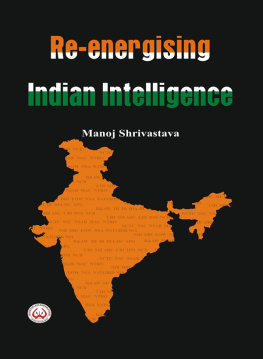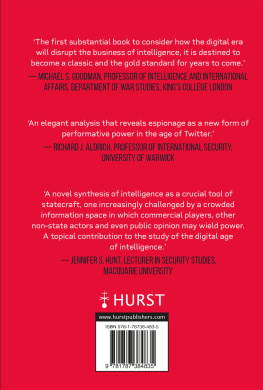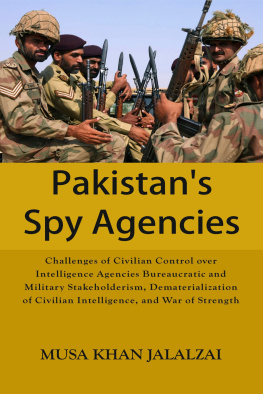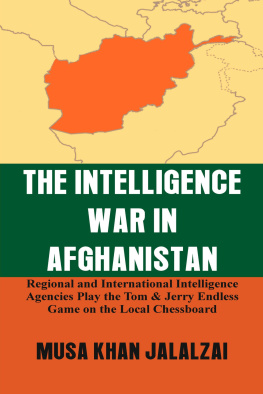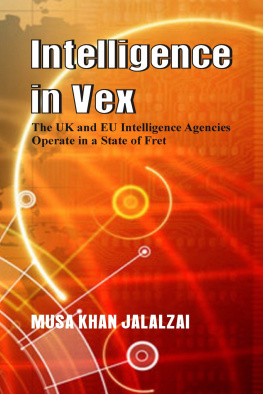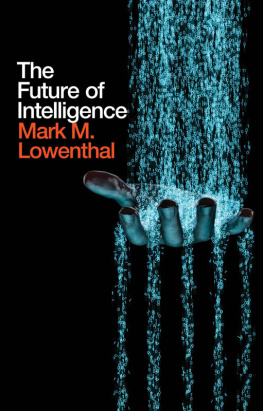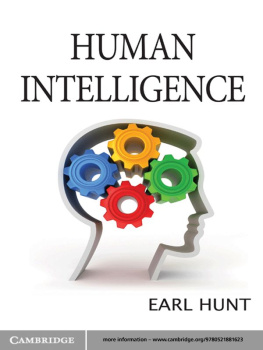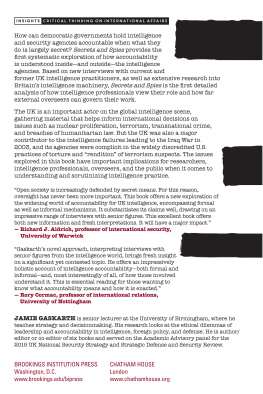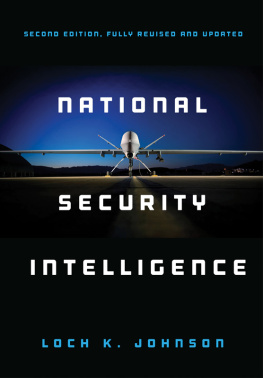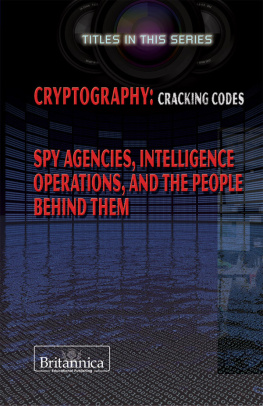RE-ENERGISING INDIAN INTELLIGENCE
E book published by
Vij Books India Pvt Ltd
(Publishers, Distributors & Importers)
2/19, Ansari Road, Darya Ganj
New Delhi - 110002
Phones: 91-11-43596460, 91-11- 47340674
Fax: 91-11-47340674
e-mail :
web: www.vijbooks.com
The Centre for Land Warfare Studies (CLAWS), New Delhi, is an autonomous think tank dealing with contemporary issues of national security and conceptual aspects of land warfare, including conventional and sub-conventional conflicts and terrorism. CLAWS conducts research that is futuristic in outlook and policy-oriented in approach.
Centre for Land Warfare Studies
RPSO Complex, Parade Road, Delhi Cantt, New Delhi-110010
Phone: 011-25691308; Fax: 011-25692347
email:
ISBN: 978-93-82573-60-9
Copyright 2013, Centre for Land Warfare Studies, New Delhi
First Published in 2013
All rights reserved
No part of this book may be reproduced, stored in a retrieval system, transmitted or utilised in any form or by any means, electronic, mechanical, photocopying, recording or otherwise, without the prior permission of the copyright owner. Application for such permission should be addressed to the publisher.
The views expressed and suggestions made in this book are based on material available in open domain and made by the author in his personal capacity and do not have any official endorsement/ sanction.
Foreword
Intelligence is reputed to be the second oldest profession of the world and yet, inexplicably, there is a dearth of professional books on this critical craft both abroad and especially in India. I would perhaps be emphasizing the obvious when I state that government, armed forces and other organs and institutions of the state, when surprised or struck by unforeseen security calamities, conveniently ascribe these systemic and leadership failures to lack of hard and timely intelligence. That there can be never foolproof and the desired levels of intelligence required, always available, makes the task of intelligence agencies all the more arduous thus the significance of timely intelligence acquisition, interpretation and analysis and more importantly, the seamless and unselfish flow of intelligence inputs to sister intelligence agencies, as required, is sine-qua-non.
As the threats to a nation ascend on the criticality or the escalation ladder, intelligence sharing between various security organs of the nation and its speedy analysis for the nations decision makers makes intelligence a more than vital tool in the overall security management of the nation. Notwithstanding its indispensability and despite India having been surprised on many occasions notably in 1962, preceding the Indo-Chinese conflict, Pakistans perfidy in Kargil in 1999, the attack on the Indian Parliament in 2001 which nearly led to another Indo Pak War, the tragic and avoidable assassinations of Prime Ministers Indira Gandhi in 1984 and then Rajiv Gandhi in 1991 point to a question whether India has given sufficient importance to this specialized discipline which is a force multiplier by any standards. Have we adequately endeavoured to inject some energy and resources into this critical capability and skill or do we have to wait for being harshly surprised over and over again? After the Kargil War and especially since the Pakistani ISI engineered terror attacks in Mumbai in Nov 2008, there have been some welcome accretions to and streamlining of our intelligence set-ups. Perhaps, like the 10 yearly Pay Commissions, India will do well to have institutionalized reviews of its intelligence agencies and their functioning in totality and carry out corrections and improvements as felt.
To the not so liberal availability of books on intelligence in India, the publication of Manoj Shrivastavas comprehensive work Re-energising Indian intelligence is more than a timely and apt addition. This book indeed covers a vast canvas historically as regards Indian Intelligence, as also gives an adequate insight into the functioning of the important intelligence agencies of the world. Manoj has analysed the current functioning of Indian Intelligence in great detail and has come out with some useful suggestions. I am sanguine that the suggestions he has proffered to galvanise our intelligence set-up will be of particular interest to not only members of the growing Indian Intelligence community but also to the Government of India to ponder over and implement as necessary.
My congratulations to Col Shrivastava on his debut and I wish him many more books in the future to be penned by him in the research of and for the benefit of national security.
Himachal Pradesh Lt Gen Kamal Davar (retired)
Founder Director General Defence Intelligence Agency and Deputy Chief of the Integrated Defence Staff
Acknowledgements
I wish to place on record my heartfelt gratitude to members of strategic and intelligence community whom I have interviewed during the course of my research. I am indebted to a large number of serving officers of civil and military intelligence agencies who expressed a desire to remain anonymous. Their names have deliberately not been included in this book.
During the course of this project, I have drawn a lot of inspiration and ideas from the report of IDSA task force on Intelligence Reforms since I have been attending their deliberations and we were working simultaneously on similar project. I also wish to convey my gratitude to large number of seminars, workshops, books and publications from where I have drawn inputs for my book.
This book could not have been possible without the institutional support from Centre for Land Warfare Studies (CLAWS). For this I would like to convey my sincere gratitude to Brig Gurmeet Kanwal (Retd), former Director, CLAWS for his highly valued guidance which proved to be the springboard for further ideas and launch pad for this analysis. My special gratitude goes to Maj Gen Dhruv C Katoch, SM, VSM (Retd), Director, CLAWS for reposing faith in my abilities and for his unflinching support for this research. I am indebted to Colonel Ashwani Gupta and Colonel Vivek Verma, former and present Deputy Director, CLAWS for their candid views and providing enabling environment for this research. I gratefully acknowledge the support extended by Ms Pallavi Ade, Publications Manager, CLAWS and Miss Aditi Malhotra in editing my book with great zeal and enthusiasm. I also wish to thank Lt Gen Kamal Davar, founder Director General, Defence Intelligence Agency (DIA) for providing detailed comments on my book and contributing the foreword .
In the end, I profusely thank my wife Sudha and son Prakhar for their support, empathy and good wishes during the course of this study. I sincerely acknowledge their contribution for bearing with my confused and preoccupied state of mind while penning my thoughts.
New Delhi Manoj Shrivastava
Jan 2013
ACRONYMS AND ABBREVIATIONS
(As they appear in the book in sequential order)
| Open Source Intelligence | - | OSINT |
| Internal Security | - | IS |
| Left Wing Extremism | - | LWE |
| Intelligence Bureau | - | IB |
| Research and Analysis Wing | - | R&AW |
| Military intelligence | - | MI |
| Defence Intelligence Agency | - | DIA |
| Centre for Land Warfare Studies | - | CLAWS |
| Joint Intelligence Committee | - | JIC |
| Institute of Defence Studies and Analysis | - | IDSA |

